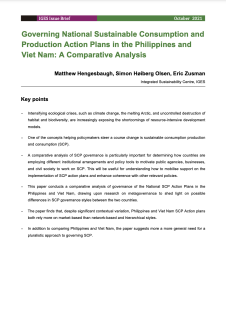
Intensifying ecological crises, such as climate change, the melting Arctic and uncontrolled destruction of habitat and biodiversity, are increasingly exposing the shortcomings of resource-intensive development models. One of the concepts helping policymakers steer a course change is sustainable consumption and production (SCP).
A comparative analysis of SCP governance is particularly important for determining how countries are employing different institutional arrangements and policy tools to motivate public agencies, businesses and civil society to work on SCP. This will be useful for understanding how to mobilize support on the implementation of SCP action plans and enhance coherence with other relevant policies.
This paper conducts a comparative analysis of governance of the national SCP action plans in the Philippines and Viet Nam, drawing upon research on metagovernance to shed light on possible differences in SCP governance styles between the two countries. The paper finds that, despite significant contextual variation, the Philippines and Viet Nam's plans both rely more on market-based than network-based and hierarchical styles. In addition to comparing Philippines and Viet Nam, the paper suggests a more general need for a pluralistic approach to governing SCP.
